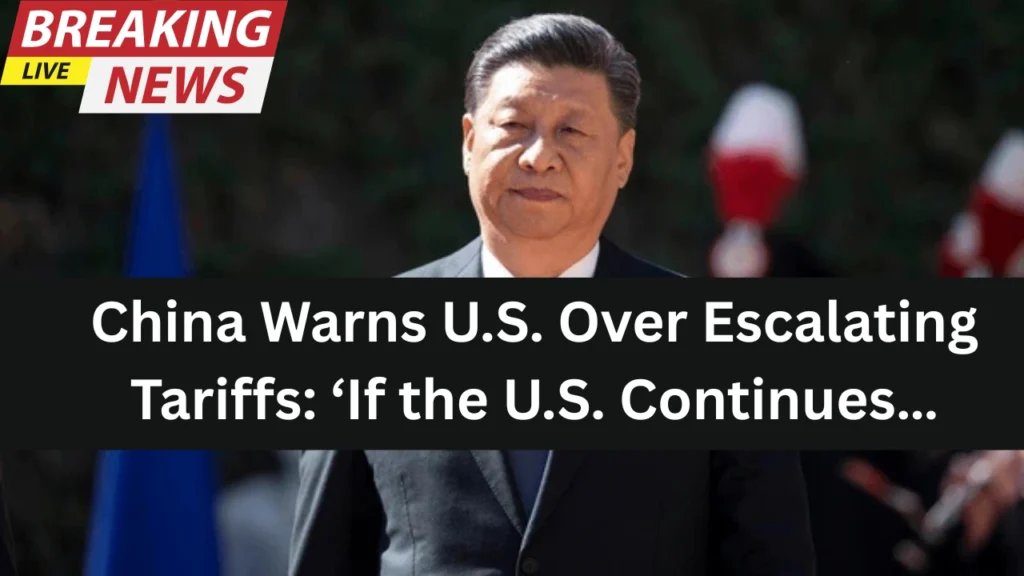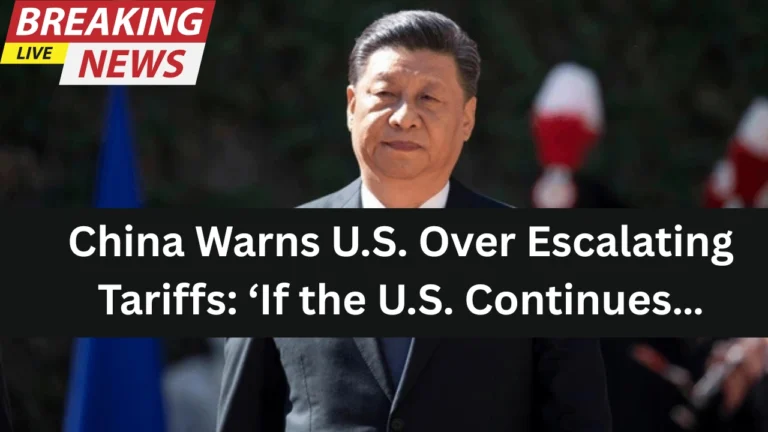In a blistering response to the Trump administration’s latest move in the ongoing trade conflict, China on Thursday warned that it would “pay no attention” if the United States continues its aggressive “tariff numbers game.” The reaction came after the U.S. imposed a staggering 245% tariff on Chinese imports, escalating an already tense trade standoff between the world’s two largest economies.

The comment was made during a routine briefing by China’s foreign ministry and reported by Reuters, signaling a sharp shift in tone from Beijing. Chinese officials made it clear that retaliatory trade measures from Washington would not deter their stance.
🔴Even if the United States imposes even higher tariffs, it would no longer make economic sense and ultimately go down as a joke in world economic history.
— Chinese Embassy in US (@ChineseEmbinUS) April 11, 2025
🔴Given that it's already impossible for the Chinese market to accept #US imports at the current tariff level, if the… pic.twitter.com/5MA0OjL5EL
Tariff War Reignited
The White House, under the renewed Trump administration, issued a fact sheet late Tuesday announcing the tariff hike. The document revealed that China will now face import duties of up to 245% in response to its recent countermeasures.
“More than 75 countries have already reached out to discuss new trade deals. As a result, the individualized higher tariffs are currently paused amid these discussions — except for China, which retaliated,” the White House stated.
The statement further alleged that Beijing has not only retaliated with tariff hikes but has also employed export bans on strategic materials, particularly those vital to national security and high-tech industries.
“Just this week, China suspended exports of six heavy rare earth metals, as well as rare earth magnets, in order to choke off supplies of components central to automakers, aerospace manufacturers, semiconductor companies and military contractors around the world,” the fact sheet read.
Beijing Strikes Back
China’s response has been swift and forceful. Last week, it raised its additional tariffs on U.S. imports to 125%, retaliating against Trump’s earlier 145% tariff hike on Chinese goods. It also filed a formal complaint with the World Trade Organization (WTO), accusing the U.S. of undermining global trade norms.
“These American tariffs go against the whole world,” said a spokesperson from the Ministry of Commerce. “They seriously damage the rules-based multilateral trading system and must be reversed.”
In parallel, China has appointed a new trade envoy, Li Chenggang, to spearhead negotiations and safeguard national interests in the face of what officials describe as “unilateral U.S. provocation.”
What’s at Stake?
At the center of the battle lies not only economic supremacy but control over critical materials such as gallium, germanium, and antimony—minerals vital to defense, electronics, and renewable energy industries. The U.S. has accused China of leveraging these resources for geopolitical influence, while China argues that export controls are a legitimate part of national security.
With both nations now engaged in tit-for-tat tariff escalations and strategic restrictions, the implications for global supply chains are significant. From consumer electronics and EV batteries to semiconductors and aerospace components, the ripple effects are likely to be felt across the globe.
Political & Economic Ramifications
The Trump administration’s hardline stance has received mixed reactions domestically. Supporters argue it’s a necessary push to curb unfair trade practices and protect American industries, while critics including Federal Reserve Chair Jerome Powell—warn it could create macroeconomic instability.
“These tariffs may put the U.S. Fed in a bind,” Powell noted in a recent press briefing. “There’s increasing tension between employment stability and inflation control.”
Meanwhile, in Beijing, President Xi Jinping made no direct mention of the new tariffs at a public event on March 28, 2025, held at the Great Hall of the People. However, state media has rallied public sentiment around the narrative of standing firm in the face of external pressure.
Global Outlook
As trade tensions escalate, countries around the world are watching closely. Many U.S. allies — particularly in the EU and Southeast Asia — are reportedly seeking clarity on where they stand amid the broader trade realignment.
While both sides signal a willingness to negotiate, no concrete talks are currently scheduled. The global economy braces for impact as the U.S.-China trade war enters a new, more volatile chapter.

